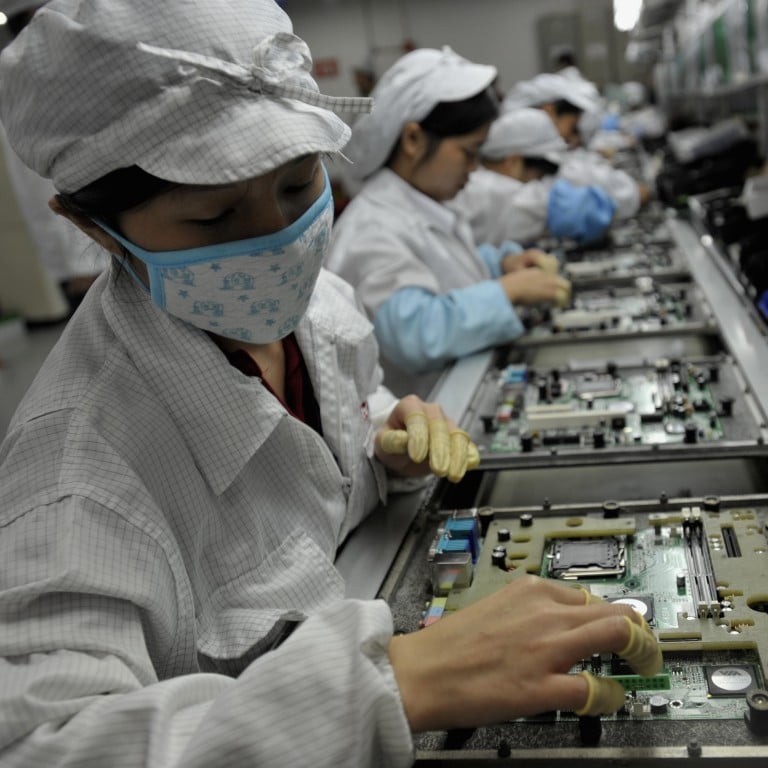
Taiwan expects AI investments of US$7.3 billion in 2024 as exports expand for third straight month
- Taiwan’s exports expanded for a third straight month in January with year-on-year growth of 18.1 per cent
- Exports of electronic components – 92 per cent of which are chips – rose by 7.5 per cent, while shipments of information, communications and audiovisual products doubled
World tech powerhouse Taiwan expects investments of NT$230 billion (US$7.3 billion) in artificial intelligence (AI) this year as its manufacturing industry pivots toward the global trend and its exports improve rapidly after a tough 2023.
Minister of Economic Affairs Wang Mei-hua said on Monday that Taiwan would reach the investment goal through a subsidy scheme, the development of generative AI semiconductors and a “pilot production line” for AI chips.
Exports, the chief moneymaker for Taiwan’s half-century-old tech hardware industry that includes advanced semiconductors, expanded for a third straight month in January with year-on-year growth of 18.1 per cent, the Ministry of Finance confirmed on Wednesday.
The unusually steep increase reflected a low base of comparison from January 2023, as well as keen interest in hi-tech exports, analysts said.
“Stronger demand and low base effects should deliver year-on-year growth in exports of electronics in January,” Moody’s Analytics associate economist Jeemin Bang said.
“Foreign demand for advanced semiconductors used in AI applications has helped lift Taiwan’s exports in recent months.”
Overseas shipments from Taiwan reached US$37.19 billion overall last month, according to the ministry.
Exports of electronic components – 92 per cent of which are chips – rose by 7.5 per cent, while shipments of information, communications and audiovisual products doubled.
Looking ahead, we think the tech sector remains at the core of Taiwan’s industrial growth momentum
The value of component exports came to US$13.67 billion, with information and communications equipment shipments at US$9.42 billion.
“We attribute most of the [fourth quarter] gain in net exports to the tech industry,” said Bum Ki Son, a regional economist with Barclays.
“In particular, we have seen a surge in AI server exports, which likely entail significant value-add from Taiwan, as Taiwan is deeply involved in the AI supply chain.
“Looking ahead, we think the tech sector remains at the core of Taiwan’s industrial growth momentum.”
Taiwan export orders plunge as global inflation fears outpace demand for AI gear
Production of chips to speed up generative pre-trained transformer (GPT) commands in smartphones will buoy Taiwan’s technology sector, analysts added.
“A gradual cyclical recovery with strong demand associated with artificial intelligence-related applications should bode well for a strengthening momentum in Taiwan’s tech exports and private investment,” said George Xu, Asia-Pacific sovereign ratings director with Fitch Ratings.
The global artificial intelligence market would see a 36.8 per cent compound annual growth rate from 2023 to 2030, according to research firm MarketsandMarkets.
Chips designed for AI can be used to run graphic processing units, memory chips, storage hardware and other parts of consumer electronics.
Taiwan already produces around 60 per cent of the world’s chips, including the most advanced, which are installed in personal computers, phones, servers and vehicles.
President-elect Lai Ching-te “has made it clear that he will continue to support industrial policies for Taiwan to become instrumental in global artificial intelligence developments, especially as far as chip fabrication is concerned,” French investment bank Natixis said on Monday.
Investments in AI this year would create 19,000 jobs, according to the outlook from the economic affairs minister earlier this week, with cumulative AI investment potentially reaching NT$2.4 trillion by the end of 2024, employing up to 168,000 people.
Mainland China and Hong Kong combined were Taiwan’s largest export market in January, taking goods worth US$12.24 billion.
Firms eye Plan B ahead of Lunar New Year as Red Sea crisis roils supply chains
Buyers in mainland China often process goods for re-export, with shipments to the region climbing by 17.2 per cent year on year in January.
Taiwan’s exports to the United States expanded by 56.6 per cent last month to US$8.4 billion, but shipments to Europe fell by 11.8 per cent year on year to US$3.18 billion.
Taiwan’s budget office anticipates 3.35 per cent economic growth this year compared to an estimated 1.4 per cent in 2023.
“As military conflicts continue and many countries will hold important elections, the global economy will encounter increasing geopolitical risks in 2024,” Chiu said.

